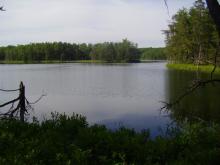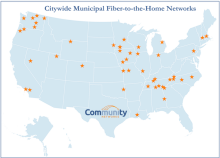Rural Telephone Cooperative Forges Its Own Path In Michigan
Can’t get telephone or Internet service? Have you tried starting your own company? In 1998, John Reigle did just that with the support of the community and Michigan State University. Today, Allband Communications Cooperative provides not only telephone service, but also cutting-edge, high-quality Internet access and environmental research opportunities in rural Northeastern Michigan.
A Story Of Promise, Betrayal, And The Telephone Company
We connected with Allband representatives who shared details about Allband's interesting and dramatic history as told by Masha Zager back in 2005. They kindly provided updates and let us know what's in store for this by-the-bootstraps effort that started in the woods of Michigan.
When John Reigle moved out into the woods past the small town of Curran, Michigan, he didn't intend to start a brand-new venture. He simply wanted to build a home and work on his consulting business; he just needed telephone service.
The large incumbent telephone company GTE (which later became Verizon, which still later sold off this service area to Frontier) had assured Reigle that the lot where he planned to build his house would be easy to connect to their telephone network. They quoted him a price of about $34 and scheduled an install date. Trusting that the telephone company’s representatives knew the service area, Reigle moved forward with his plans to build.
After he finished constructing his house in 1998, Reigle contacted the telephone company to finalize his service connection. Despite the earlier assurance that his location would not prove a problem, Reigle found that he was miles away from the GTE network. This time, the company quoted $27,000 to run a copper telephone line from the highway to his new house.
His consulting firm could not operate without a telephone so he decided to bite the bullet and agree to the steep price. GTE rescinded its quote, however, and no matter how much Reigle offered, the company would not run telephone service to his new house.







 Holland has had dark fiber in place for decades for the municipal electric operations. Later BPW extended it to schools and businesses that needed high capacity data services. After years of incremental expansions, the network is now more than 150 fiber miles throughout the city.
Holland has had dark fiber in place for decades for the municipal electric operations. Later BPW extended it to schools and businesses that needed high capacity data services. After years of incremental expansions, the network is now more than 150 fiber miles throughout the city.

